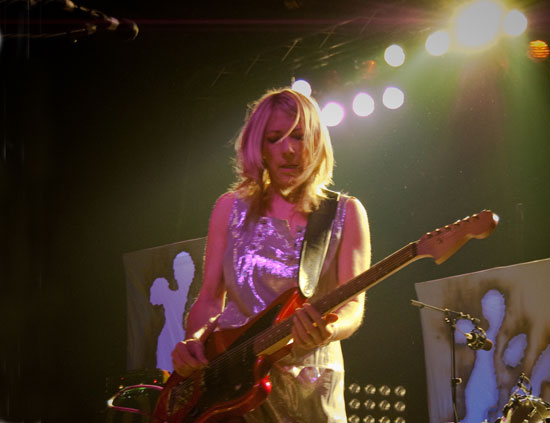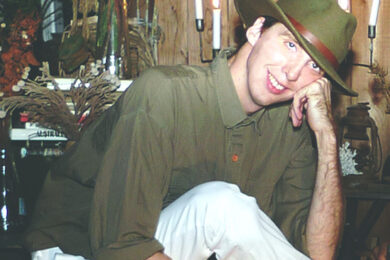Berlin’s Risiko Bar, where Nick Cave drank ’til the he could drink no more, is now a ticket shop for Germany’s railway company Deutsche Bahn. The Schöneberg apartment where David Bowie and Iggy Pop lived in the 1970s is currently occupied by a Turkish family allegedly unaware of The Dame’s legendary contributions to pop culture. Hansa Studios’ high-ceilinged, wood panelled room – in which, amongst many other classic sessions, Bowie recorded Heroes – is these days available to hire for events and parties. You can see each of these on Berlin’s Fritz Music Tour should you so wish: they remain a part of the landscape even if the city around them is radically different to the one in which they had their heyday. But they just don’t mean so much anymore: they’re easy to miss and represent little more than reminders of how things used to be.
Meanwhile, down by Berlin’s recently closed Tempelhof Airport — a vast building awaiting redesignation as offices or film studios or whatever the local government finally decides — the US Army’s former gym has entered its eleventh year as a music venue. Inside are crammed 3,500 once ideologically engaged Berliners and, on stage, one of the bands that meant most to them, Sonic Youth, a group whose name — now that three of them are into their sixth decade on this earth — invites at least gentle mockery. The musical environment has changed radically in the 28 years since they first formed in New York, when their guitar squalls, love of the avant-garde and No Wave punk rock ethos represented a wake-up call for rock music. Nowadays scratching guitar strings with a drumstick or jamming a knife against the fretboard are de rigeur for any band attempting to establish their leftfield credentials. Sonic Youth remain a part of the landscape, however, if one overlooked by many. But are they still relevant? Do they represent anything more than nostalgia for the glories of our youth? Or are they, like the Risiko Bar and Bowie’s Hauptstrasse apartment, simply empty shells of a past in which we (wish we) were a part?
The thing about Sonic Youth is that they represent a genre all their own. They’ve defined a noise for which the only description is ‘Sonic Youth-y’. No one else sounds quite like them. Many have tried, of course — Blonde Redhead and Liars, to name but two — but they remain in thrall to the Youth because the Youth got there first. The sheer volume of acts that have been inspired by Sonic Youth in one way or another has actually rendered almost mainstream what was once dramatic, experimental and alien. So while it’s still possible to refer to the Youth’s music as challenging — especially if one’s yardsticks are Miley Cyrus and Shakira — the truth is that to most fans of indie rock, young or old, the sound is familiar. In fact, to those who have followed their career for a while, it’s strangely comforting — rather than shocking, as it once was — to hear Thurston Moore’s metallic twangs, Lee Renaldo’s idiosyncratic chords, Kim Gordon’s seemingly stoned mumbles. It’s a musical environment in which we feel at home because we’ve known it so long, and they remain the ones that manufacture it best. And even if it’s still new to some, there are enough bands out there now who’ve scavenged from the Youth for this alleged noise to appear less than troubling; instead, they maintain its status as contemporary. But it’s still their genre, copyright Sonic Youth.
The beauty of the Youth is that within their universe they appear to remain defiantly experimental, and so to their audience they represent proof of the fact that life has not degenerated into a predictable suburban existence free of anything that rocks the boat. But the Sonic Youth of tonight is slick and palatable, even given to moments in which Moore conducts ‘big rock endings’. The shapeless screes of feedback and freeform jamming are nowadays reserved for smaller unannounced shows or their SYR releases. These bigger appearances are tight, fiercely professional and, frankly, comparatively ‘pop’. At one stage Moore even pulls out a stool and sits while he strums an acoustic guitar. Gone now, for the most part, are reinterpretations, replaced instead by reiterations, the band rattling through 90 minutes of Sonic Youth-y rock that’s never less than exciting but which rarely stretches the parameters of what has gone before.
Whether this is a good thing depends entirely upon what you want your Sonic Youth to be. Berlin, quite clearly, likes this Sonic Youth. The crowd roars its approval between songs, many of them taken from The Eternal, a so-called ‘return to form’ that’s actually little better or worse than any of their more recent albums. After the show’s end many punters refuse to leave the venue, yelling for a ‘Zugabe’ for a good fifteen minutes despite the lights going up and equipment being broken down around them. Fans can find little to argue with in a show that seems typically full of conviction, though the truth is that the band’s studied sense of ennui is so polished that even if they were in fact thoroughly bored and going through the motions no one would recognise it. In fact, apart from the inevitable announcement that it’s good to be back in Berlin, the only recognisable words Moore utters throughout the show are "Anti-Orgasm". But no one seems to care because you don’t come to a Sonic Youth show to relate.
If this sounds snide, it’s not meant to. Sonic Youth rock, and it’s only those who hold onto a precious ideal of the band as representatives of experimentalism at its apex that are disappointed. Sure, on tonight’s evidence this is now The Kim & Thurston Show, with Renaldo given the mic only once (though this may be due to a recent wrist injury), Mark Ibold providing a solid but undistracting bottom end, and Steve Shelley reliably (and undeniably faultlessly) battering his kit like Moe Tucker conjuring up the spirit of Keith Moon.
Granted, even their final encore of ‘Death Valley 69’ — a song that your correspondent has previously declared to herald a perfect Sonic Youth gig — is given a streamlined alt-rock overhaul, its psychotic racket subdued in favour of a disciplined, almost formal structure and ‘Evol’ sounds so scrubbed up that for a moment it could easily sit on The Eternal. But unless you’ve come to witness the kind of trumpet parping and atonal ramblings that characterised their notorious All Tomorrow’s Parties appearance in 2000 there’s no reason to feel anything other than giddily excited by a show this vigorous and thorough.
The world is changing, has changed — nothing we can do will prevent that. Our expectations have changed, must change too. The time for Sonic Youth to employ John Cage’s aesthetics at a mainstream rock gig has passed. Nick Cave is no longer shooting up in Yorkstrasse and is instead recasting himself as a man of letters; David Bowie stopped sipping coffee in the Anderes Ufer café long ago and has, to all intents and purposes, retired. But Sonic Youth are still churning out relatively vital leftfield rock that, were it the product of pimply urban teenagers, might represent the future. Their aesthetic may have altered with the passing of time, their avant-garde tendencies now consigned to a small annex, and they may have tidied up their messier toys, only plucking them from dusty boxes when they have the opportunity to indulge. But they refuse to consign themselves to the history books. Instead they soldier on: consistent and reliable, solid and dependable; a part of the landscape that’s increasingly ignored in favour of flashier, more modern features, but which they occupy resolutely and with few concessions. This is the youth of today, and as long as there is Sonic Youth there is surely hope.
For more pictures of Sonic Youth in Berlin, click below



